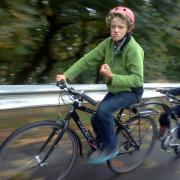 The state of play on the transportation bill seems to change daily, if not hourly, here in Washington, DC. Last week, negotiations between the House and Senate broke down and it seemed that a transportation extension was likely.
The state of play on the transportation bill seems to change daily, if not hourly, here in Washington, DC. Last week, negotiations between the House and Senate broke down and it seemed that a transportation extension was likely.
Resource Library
State agencies have a significant role in influencing the funding and policy that affects local park access. The Safe Routes Partnership set out to work with states to establish collaboration between agencies whose work impacts local park access and build on opportunities for active transportation to all community destinations. The Safe Routes Partnership recruited six states over two years from a pool of 13 applicants to work on the internal systems that could support local park access. During that time, we also worked with two of those states, Colorado and Pennsylvania, to build a cohort of local partners elevating community power and momentum to improve local park access. Below is a summary of our approach with examples from Colorado and key takeaways from the experience for both state and local participants. The strategies and outcomes outlined can act as a model for other states to take on this important work as a tool for increasing physical activity, safety, and connectivity throughout communities.
On May 30, the Ohio Department of Transportation (ODOT) announced their 2012 Safe Routes to School program awards, funding 68 projects in 48 communities, totaling more than $16 million dollars. An additional 19 communities have been awarded funds for school travel plan development. This is the highest amount of funding the Ohio program has distributed at one time. For a complete award list, click here.
 What’s New New?
What’s New New?
 I have written before about how well the state network project is doing. Looking at the first seven months, I am happy to report there has been a real growth spurt as the number of participants increases, as do the contact lists. And the organizers’ skills are getting noticed as are the networks activities. Here are some snapshots:
I have written before about how well the state network project is doing. Looking at the first seven months, I am happy to report there has been a real growth spurt as the number of participants increases, as do the contact lists. And the organizers’ skills are getting noticed as are the networks activities. Here are some snapshots:
Montana Safe Routes to School continues to improve safety and healthy options for children across Montana. In March of 2012, Montana Safe Routes to School announced $928,406 in Safe Routes to School awards for state fiscal year 2013, which began July 1, 2012. Six communities were awarded infrastructure funding for projects ranging from $14,000 for signing and crossing improvements to $114,386 for a pathway in eastern Montana.
 The Safe Routes Partnership's state network project is working to get more Complete Streets policies and improve current ones. As we do this, we learned about several jurisdictions in Florida that have taken their own initiative and are doing just that. We will continue to work hard to make sure this trend continues in our network states!
The Safe Routes Partnership's state network project is working to get more Complete Streets policies and improve current ones. As we do this, we learned about several jurisdictions in Florida that have taken their own initiative and are doing just that. We will continue to work hard to make sure this trend continues in our network states!
In 2012, the MAP-21 transportation legislation made changes to the Federal Safe Routes to School program that added a required state or local match of up to 20 percent of project costs.
 New Jersey’s Zealous Nuts: The 2012 ProWalkProBike: Pro Place conference brought together hundreds of “zealous nuts” who are dedicated to people walking and bicycling more often. Fred Kent, founder of Project for Public Spaces, opened t
New Jersey’s Zealous Nuts: The 2012 ProWalkProBike: Pro Place conference brought together hundreds of “zealous nuts” who are dedicated to people walking and bicycling more often. Fred Kent, founder of Project for Public Spaces, opened t
This webinar from December 9, 2014 explores the process used to create Complete Streets in a variety of southern settings.
 There is a scene, from a once famous movie where this guy busts through the door to expel his undying affection for a woman. She completes him, and he wants to make sure she knows it.
There is a scene, from a once famous movie where this guy busts through the door to expel his undying affection for a woman. She completes him, and he wants to make sure she knows it.
I’m no Tom Cruise, but I want you to know: You complete me.
 The Safe Routes to School Mississippi network prides itself on the ability to connect with those organizations within the state that are passionate about ridding the state of the childhood obesity epidemic. We continue our efforts in expanding our parameters to partners that are champions for the cause. While attending a meeting with the Obesity Coalition (formulated by The P
The Safe Routes to School Mississippi network prides itself on the ability to connect with those organizations within the state that are passionate about ridding the state of the childhood obesity epidemic. We continue our efforts in expanding our parameters to partners that are champions for the cause. While attending a meeting with the Obesity Coalition (formulated by The P

 We travel just over two miles to school each day with our two boys - by bike, of course, most days. I am proud that my ten-year old son is now riding his six-year old brother to school on a tag-along! Both boys insist on it now. This picture shows the Big Guy showing off his tough guy face on a recent school trip.
We travel just over two miles to school each day with our two boys - by bike, of course, most days. I am proud that my ten-year old son is now riding his six-year old brother to school on a tag-along! Both boys insist on it now. This picture shows the Big Guy showing off his tough guy face on a recent school trip.
 The past several months have been rife with debates, campaign speeches and rallies supporting certain candidates, ideologies and policies. Over the past couple of weeks, many Americans have exercised their right to vote into office the state and local leaders of their choice as well as the President of the United States of America.
The past several months have been rife with debates, campaign speeches and rallies supporting certain candidates, ideologies and policies. Over the past couple of weeks, many Americans have exercised their right to vote into office the state and local leaders of their choice as well as the President of the United States of America.
To date, Georgia Safe Routes to School has awarded 48 projects (totaling approximately $18.5 million). Some examples of the various types of infrastructure projects are installation of sidewalks, multi-use paths, crosswalks, raised crosswalks, multi-use paths, LED crossing signs, ADA ramps, bike lanes and bike racks.
 Right now my work in the Bay Area region is at a very exciting phase. While earlier in the year our efforts were concentrated on our metropolitan planning organization (MPO)—the Metropolitan Transportation Commission (MTC)—our work now needs to focus on the nine counties of the San Francisco Bay Area.
Right now my work in the Bay Area region is at a very exciting phase. While earlier in the year our efforts were concentrated on our metropolitan planning organization (MPO)—the Metropolitan Transportation Commission (MTC)—our work now needs to focus on the nine counties of the San Francisco Bay Area.
The School Site Audit will help determine walking and bicycling conditions on or adjacent to school property. Similar to the School Site Audit, the Neighborhood Site Audit is designed to help you evaluate the walking and bicyclingconditions by inventorying neighborhood intersections, streets, and sidewalks used by the students.
 What better way to ring in the 2013 New Year than to reflect on what we are thankful for and resolve to improve.
What better way to ring in the 2013 New Year than to reflect on what we are thankful for and resolve to improve.

